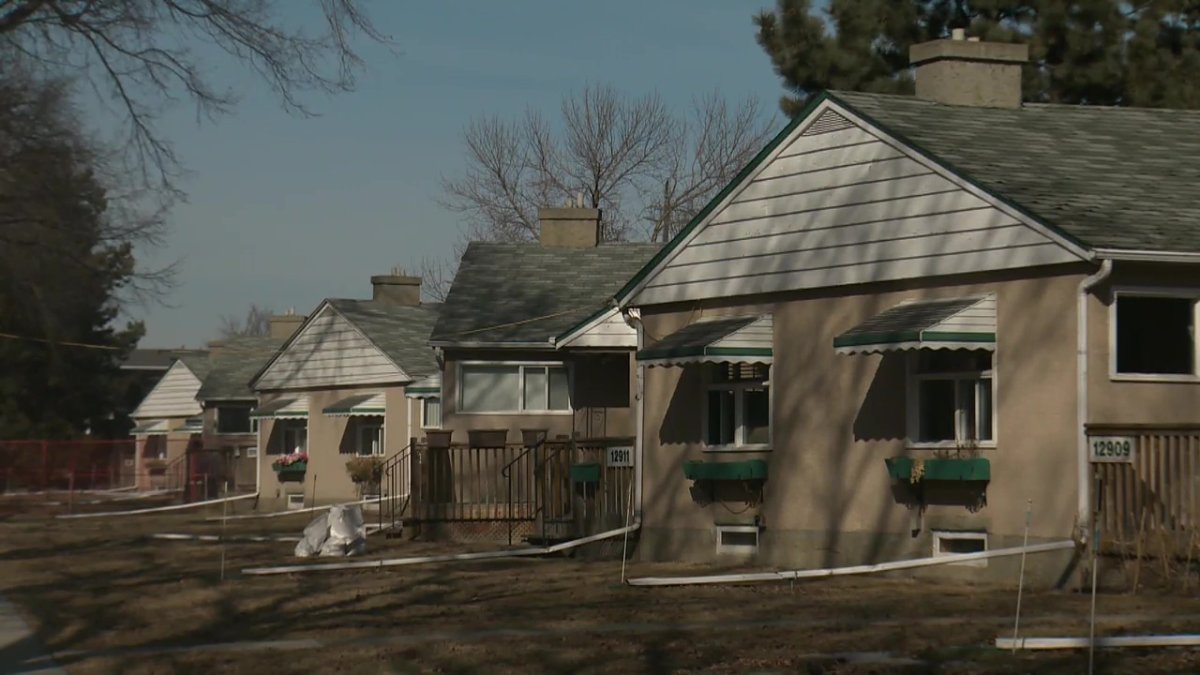The construction of more than 200 supportive and seniors’ housing units at six sites across Edmonton is now fully funded and expected to be complete by this time next year, thanks to a $24.8 million federal announcement Wednesday.

The announcement was two-fold: new dollars for 167 units of affordable and supportive housing at three sites around the city, plus the replacement and expansion of a fourth facility specifically for seniors.
Three of five planned supportive housing sites receive new dollars
Supportive housing is more than just a roof over a person’s head: it can also include on-site services such as home care, disability supports, health care from nurses or other medical professionals, medication management, cultural programming for Indigenous residents and options to learn life skills such as budgeting.
“These new housing units are going to make a significant difference for so many people,” Mayor Don Iveson said.
The bulk of the funding is coming from the government of Canada and Canada Mortgage and Housing Corporation’s rapid housing initiative — a $1 billion program aimed at addressing the urgent shelter needs of vulnerable Canadians by quickly create new affordable housing.
The City of Edmonton will receive $17.9 million for three new housing sites being developed in partnership with Homeward Trust, an agency that works to get vulnerable people and people living with homelessness off the streets and into stable homes.
The developments in three Edmonton neighbourhoods will provide 130 units of supportive housing: 30 units at 12312 112 Ave. in Inglewood, 46 units at 6503 101 Ave. in Terrace Heights and 54 units over three former residential lots at the corner of 130 Street and 111 Avenue in Westmount.
The Alberta government will also provide an additional $6.5 million for the Westmount modular development through the $500-million municipal stimulus program, which gives funding to municipalities and Metis settlements to build critical infrastructure and support economic recovery by creating jobs.
“Those in severe-housing need — who are experiencing homelessness, or those who are at risk of experiencing homelessness — will soon have a new place to call home,” said Ahmed Hussen, the federal minister of families, children and social development, who is also responsible for Canada Mortgage and Housing Corporation (CMHC).
New seniors housing in Lauderdale

Get daily National news
The other project that received money on Wednesday was Lauderdale Homes, an existing 12-duplex community on 103 Street near 129 Avenue, operated by GEF Seniors Housing (formerly Greater Edmonton Foundation) — Alberta’s largest provider of subsidized seniors’ housing.
It will be replaced with Lauderdale Terrace, a 37-unit housing complex for low-income seniors, including couples and women, with 12 of the units reserved for senior women.
GEF Seniors Housing executive director Raymond Swonek said the duplexes will be converted into one- and two-bedroom units.
“We can start re-developing the Lauderdale site much sooner than we’d originally hoped and offer the first 10 units for seniors as early as this September.”
The remaining 27 units are expected to open to residents next March, Swonek said.
“This funding helps us further our vision of positively influencing seniors’ quality of life, as this project is seniors-friendly, pet-friendly and environmentally-friendly.”
Construction of all five supportive housing sites now funded
Through the federal government’s rapid housing initiative, the city already had construction funding approved for two of five supportive housing sites.
Last fall, $17.3 million from the same program was allocated to build 80 long-term supportive housing spaces. Those housing spaces in the King Edward Park (30 units) and Wellington (50 units) neighbourhoods are expected to be in place by the end of 2021.
- Cineplex slapped with record $38.9M fine over online booking fee
- Conservatives set to table non-confidence motion Tuesday. What to expect
- After controversial directive, Quebec now says anglophones have right to English health services
- Home reno spending was up $300B over pandemic, Re/Max Canada says
In all, the funding will allow the City of Edmonton and Homeward Trust to quickly build five supportive housing developments, with 210 units, by March 2022.
“By the end of this year, we will be housing individuals that right now, have absolutely no other options,” Homeward Trust CEO Susan McGee said.
Add in the 37 units at Lauderdale Terrace and that’s 247 homes for people who would otherwise struggle to put a roof over their heads.
Wednesday’s announcement means construction of all five sites are now funded. The city had previously committed to funding all of the supportive housing projects out of its own reserves, regardless of whether it got money from higher levels of government — but this announcement allows that money to be spent elsewhere.
“It should’ve never fallen to the municipality, with eight cents of everyone’s tax dollars, to fund housing units outside of our jurisdiction,” Iveson said.
Edmonton mayor calls on province to step up with operating funds
Supportive housing has been a priority for Iveson for many years, arguing it costs less in the long term to get vulnerable people off the streets, and out of emergency rooms, jails and homeless shelters.
“It doesn’t take very many nights at the hospital or weekends at the (Edmonton) Remand Center to pay for housing,” he said last month.
The city asked the province for $5.9 million in the 2021 budget to operate the supportive housing units being built, arguing it would it pay for itself in reduced interactions with the criminal justice and health care systems.
The requested funds were not in the provincial budget tabled at the end of February.

While the money announced Wednesday will cover 210 supportive units, the city said 900 are needed — and have been since before the COVID-19 pandemic even began. Officials said the health crisis just underscored the need and made existing housing challenges worse.
“We’ve also been turned down — and this is no fault of the (federal) minister — for another 480 units worth of applications in the project stream, because of the province of Alberta’s position that they will not commit to fund the operating dollars,” Iveson said.
The mayor said federal housing dollars are being left on the table if the United Conservative government doesn’t step up to fund operating costs.
“I’m sure we’ll be able to get more construction jobs created, more units secured and online if the provincial government will only do its job in this regard,” Iveson added.
“You can’t have one order of government missing. We need all orders of government at the table,”Hussen said.
For now, operating costs will come from Homeward Trust — taking money away from other outreach projects.
“We know that these announcements are just a start,” Iveson said, again putting pressure on the provincial government.
“Making real and lasting progress on our shared goals to end chronic homelessness will require continued collaboration and commitment from all levels of government.”
Hussen also echoed Iveson’s sentiment.
“We have so many good projects that we can’t get to — not because they’re not good projects, but because we don’t have enough money.”
— With files from Sarah Ryan and Emily Mertz, Global News
















Comments